Career Booster North America: Interviews with German researchers in the USA and Canada
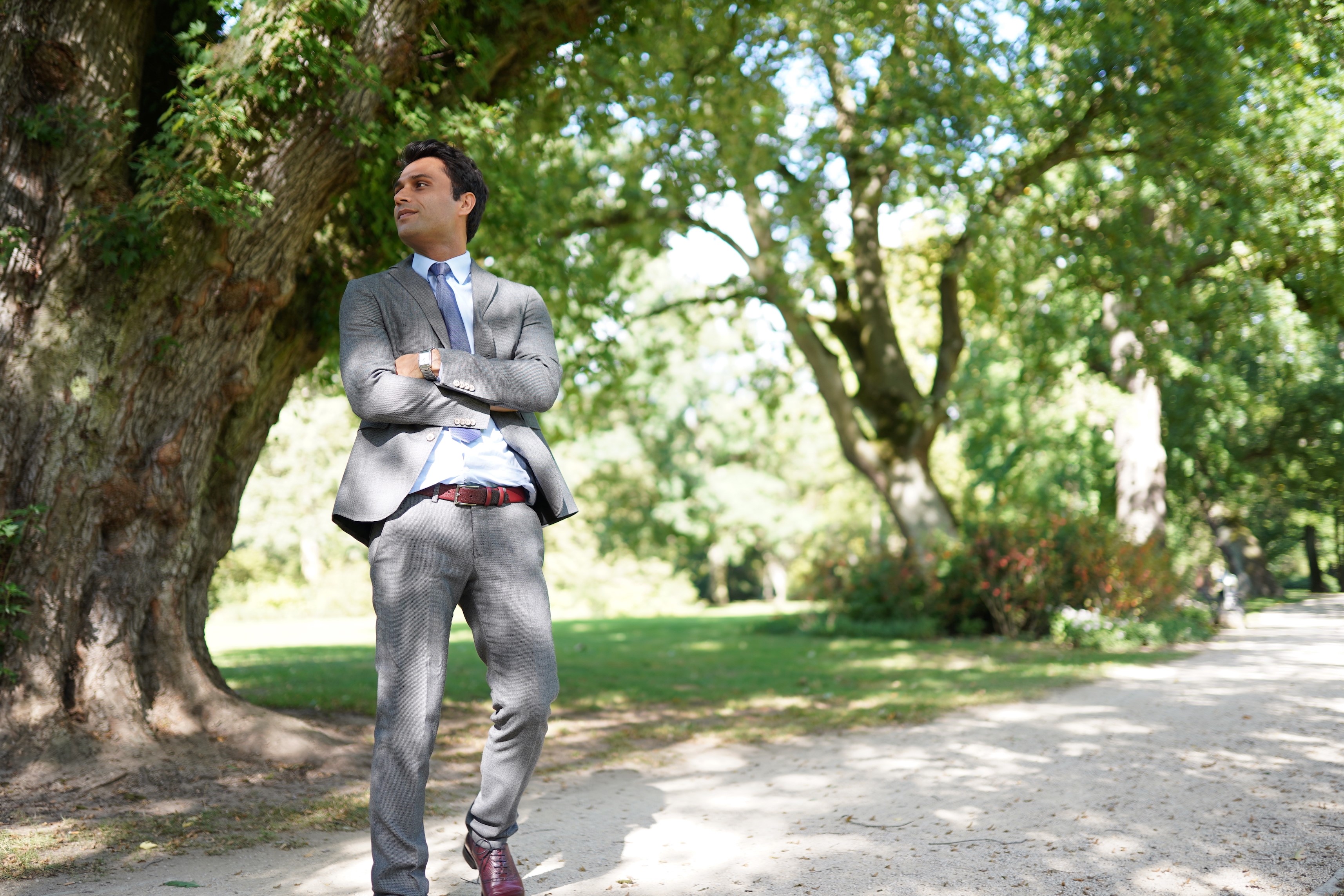
Ein Sommer in Maine – Dr. Nadjib Dastagir
© privat
(12/13/22) Through its research fellowship program and Walter Benjamin Fellowship, the DFG supports early-career academics by funding an independent research project abroad and, since 2019, in Germany too. Many of these fellowships are taken up in the USA and to a lesser extent in Canada. In a series of talks, we aim to give you an impression of the range of DFG funding recipients. In this edition we take a look at who is behind funding number DA 2265.
DFG: Dr. Dastagir, thank you so much for taking the time to talk to the DFG’s North American office. An online search for your name reveals a lot of awards and other accomplishments. You received the Einstein-OWL Prize for outstanding achievements in the natural sciences, for example, and you studied mathematics and physics at Bielefeld University at the tender age of 16. Delving further on the internet, it seems you’ve passed both the German and the American state examinations in medicine, and you’re about to complete your MBA studies at Husson University. As if all that weren’t enough, you also spent a year in New York City researching nerve regeneration at New York University (NYU) through the Biomedical Exchange Program (BMEP). Can that really all be you – or have I been barking up the wrong tree?
Nadjib Dastagir (ND): Barking up the wrong tree is certainly a pretty good description of a lot of what’s to be found on the internet! But first let me express my thanks for the opportunity to talk to you and in particular for the DFG’s generous sponsorship of my research stay here in Maine – which has taken a little longer than originally planned due to the pandemic. But to return to my career: you’re not actually barking up the wrong tree at all – in fact you’ve done some quite detailed research and the points you mention are indeed accurate. Educational opportunities in my country of birth are very limited, so the concept of education is particularly important to me, and I take every opportunity to broaden my horizons.
DFG: You spoke of the country of your birth. I assume you were not born in Germany and you speak other languages?
ND: My mother tongue is Dari Persian. My parents came to Germany from Kabul as political refugees when the situation worsened there as a result of the civil war. I grew up in northwest Germany.
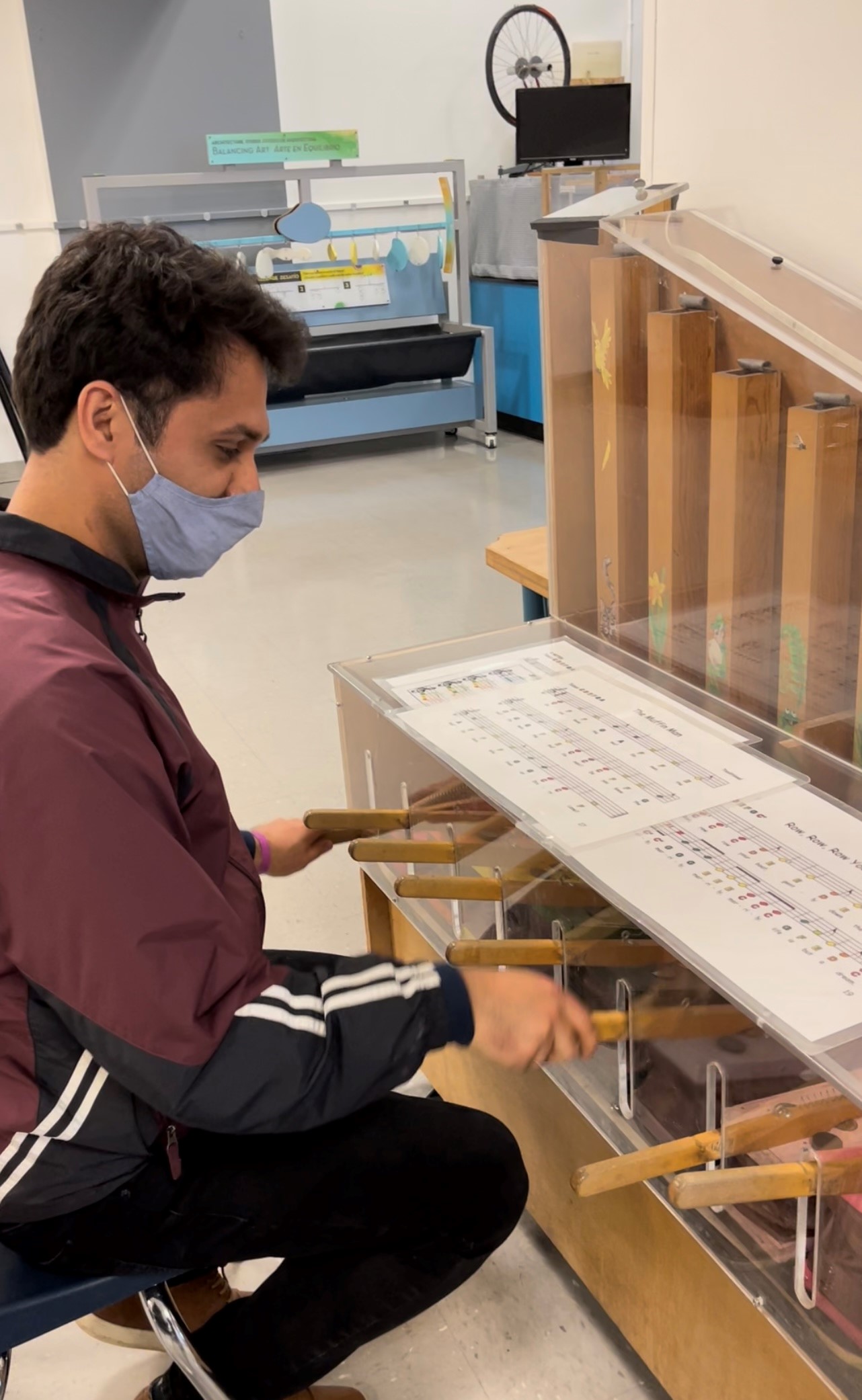
Entspannung im Labor: Nadjib Dastagir spielt „A Whole New World“ (Alan Menken, Tim Rice) aus dem Musical „Aladdin“
© privat
DFG: And you probably didn’t go straight from there to the USA to do a postdoc, I assume? Perhaps you could describe in broad outline the intermediate steps, and what it was that led you to study medicine. Was your family a major influence?
ND: My father was employed in Kabul at the interface between the military and healthcare and my mother was the headmistress of a primary school, so medicine was actually not such a far cry in terms of family leanings. But more important factors were certainly an overall focus on education and attendance at a good school. In my case, it was a secondary school that teaches some subjects in English and also gives gifted students the opportunity to attend courses at Bielefeld University. I was able to pick up credits in math and physics there before taking my university entrance qualification; at that time I was certainly able to imagine pursuing a career in one of those fields. One of the highlights at the end of school was an award in the Einstein-OWL competition: my advanced chemistry course won for a project on heat storage using microencapsulated paraffin. The prize money was obviously much less important than the combination of curiosity, systematized effort and the recognition that the competition brought me. That was one of the reasons I enjoyed my school days so much: you could attract interest just for knowing things. This notion that knowledge can have sex appeal too is probably one of the underlying ideas behind the TV series The Big Bang Theory.
DFG: But you didn’t go on to study chemistry, nor did you finish your studies in mathematics and physics, though you did progress quite a long way -- ultimately opting for medicine instead.
ND: Yes, my penchant for a concrete subject matter was the deciding factor here. Mathematics is the language through which the natural sciences generally make themselves understood of course, but it does get increasingly complex, and it eventually became too abstract for me towards the end. Even physics at an advanced stage is mainly about generating and analysing very abstract data, which is why I preferred to study biology and medicine, because you can “see” more tangible outcomes. Take the process of flow cytometry for example, which you can use to “measure” cells and “read” their properties, or fluorescence microscopy, and the now very advanced processes of DNA sequencing and CRISPR technology. These are all highly intriguing techniques where you can literally look at life at the molecular level and “surgically” cut into DNA with CRISPR. In addition to this concrete view of the living world, medicine also gives you the opportunity to provide direct and tangible help, and the foundations for this can be improved even further through research. For me, that’s an ideal combination.
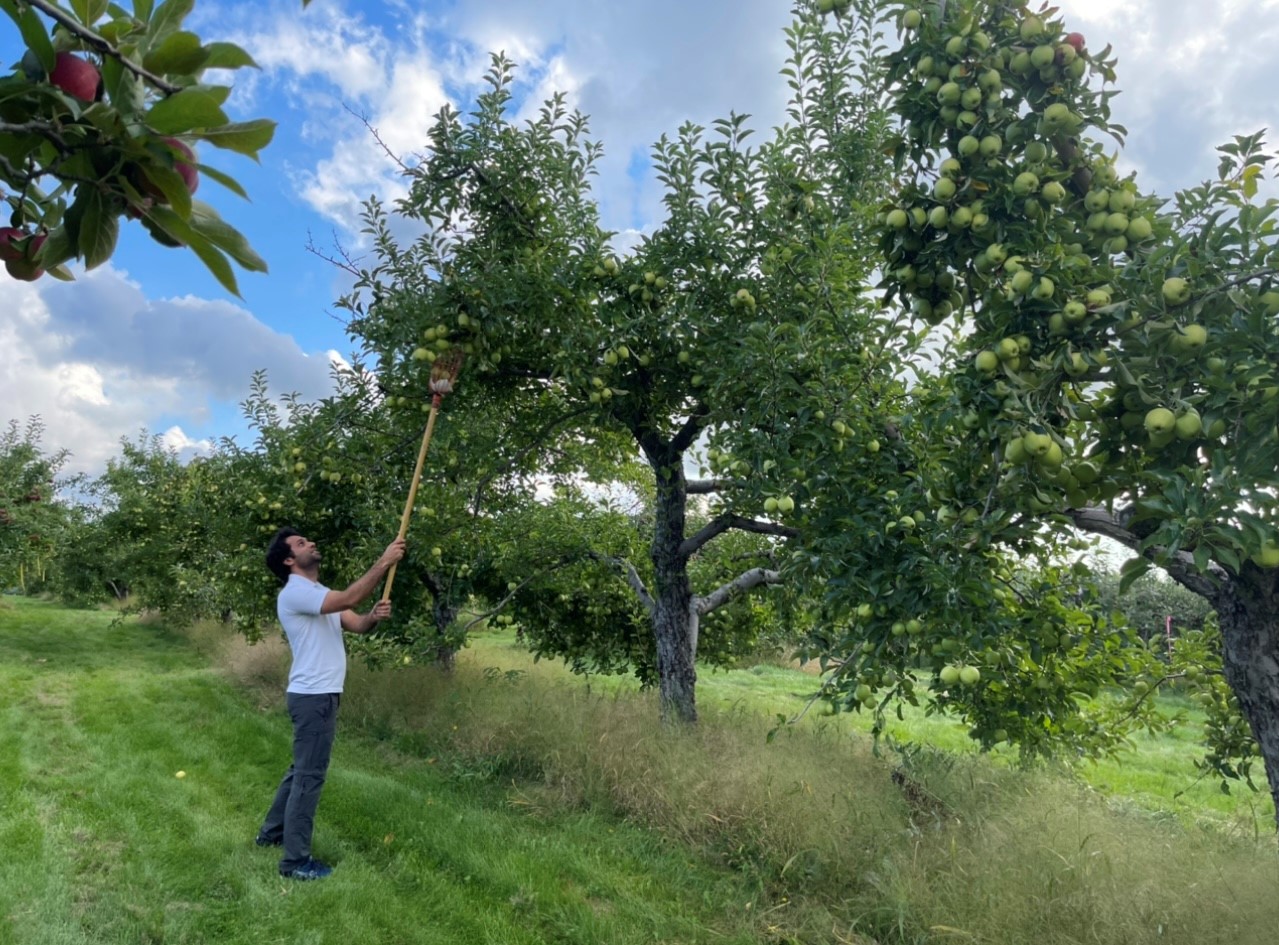
Bei der Apfelernte
© privat
DFG: Researching your family name further, the first name Khaled appears, linked to the Department of Plastic, Aesthetic, Hand and Reconstructive Surgery at MHH in Hanover.
ND: That’s my elder brother. I completed my doctorate in that department in 2017, and he did as well. And from summer 2022 we’ll be working there under the leadership of Professor Dr. Peter Maria Vogt. Professor Vogt was a great mentor quite early on in both my career and that of my brother Khaled, consistently focusing on reinforcing and expanding our strengths. He recognised our skills and potential and he got us both excited about plastic aesthetic surgery.
DFG: I suppose you’re tired of being asked the typical “cosmetic surgeon” question?
ND: In California, Florida or New York, that might be irritating. But in Germany, people are much more traditional, and the four pillars of plastic surgery – i.e. hand, burn, reconstruction, and aesthetics – are described in terms of clinical disease patterns. The aim is to give patients the opportunity to be part of society again. It starts with functionality and extends to aesthetics, i.e. when disfigurements are corrected in such a way that people feel bold enough to go outside again. The pressure to conform – further intensified by social media – may now be a factor in terms of volume in a lot of rich countries, but plastic surgery is actually not “cosmetic surgery”: it’s about restoring functionality in social terms as well, and also quality of life. You can see this if you look at the advances made in the discipline: they weren’t achieved in Hollywood, but in hospitals run by professional associations, and previously in field hospitals in the great wars of the 20th century.
DFG: Why does a surgeon go into research?
ND: It does actually happen quite a lot, but allow me to elaborate a little here. Consider the history of surgery, from Ibn Sina’s (Avicenna’s) contributions to the treatment of traumatic injuries through to Ferdinand Sauerbruch, one of the most important and influential surgeons of the 20th century. Both men were not only gifted surgeons, they were great researchers, too. It was the drive for innovation and excellent research that gave these personalities the opportunity to significantly change the history of medicine. If you visit a surgical ward today and look around at tumour treatment or even oral surgery, you see a lot of surgery involving highly sophisticated techniques, right down to the micro level for treating vessels or nerves, for example. I believe that in science you need a lot of curiosity, perseverance, a bit of luck and inspiring mentors. Here I should once again mention my two mentors Professor Vogt and Professor Haller, and also the DFG – it was solely due to this combination that I was able to undertake my extraordinary scientific journey in the first place. Without great mentors and a research funding organization like the DFG, the opportunities to turn my enthusiasm for science into action would have been extremely limited. Opting for surgery in particular was a much easier step. If you want to help as a doctor today, you can hardly avoid surgery, and it’s a really great feeling for a doctor to be able to “repair” a patient’s body. Of course, we always strive to achieve a “healthy” state, but even the world’s best surgeon can’t achieve this in the sense of restoring the patient to their original state.
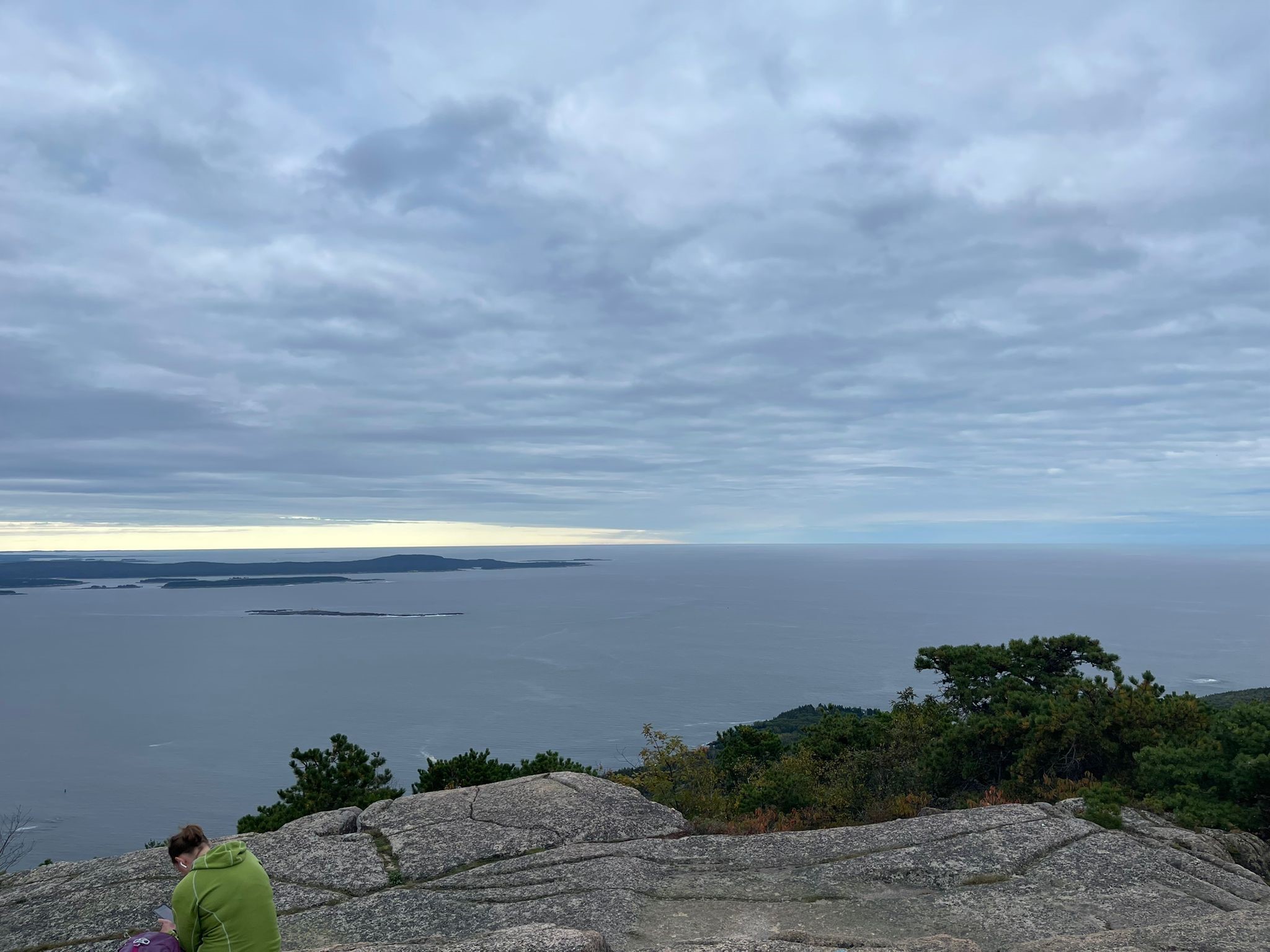
Blick vom Acadia-Nationalpark auf den Atlantik
© privat
DFG: Why is that?
ND: There might be numerous reasons, such as dead or burnt tissue for example. When you make a cut as a surgeon, you create wounds, and scars form in the healing process. While scar tissue is useful in many ways – after all, there are millions of years of natural “research and development” that have gone into it – scar tissue is not always functional in all aspects, and in many cases it would actually be preferable to see regeneration rather than scarring. There are much better regenerative abilities in other parts of the animal kingdom. A superstar in terms of regeneration is the axolotl – a Mexican salamander that can regenerate anything, including parts of its brain. These models are highly interesting, but still far from applicable to human beings. We might be able to regenerate a cut fingertip or a bite on the tongue, but beyond that there’s currently still a lot of surgical patching, transplanting, replanting, and reconstructing to be done. Since the axolotl is so far removed from human beings, however, I’ve now shifted my research to the mouse model, which will make translation to humans much easier. The pandemic was also a factor in the change of model organism.
DFG: You mentioned some millions of years of natural “research and development” in humans. Why haven’t we evolved like axolotls in terms of our physical regenerative capacity? What advantages do we have over these amphibians – except of course that we’re the ones who keep them in aquariums, rather than the other way round!
ND: Yes, this kind of trade-off is an intriguing question, not least because it’s still fairly speculative. Immune defence is a key factor in wound healing in humans, and in a sense wound healing can be described as an inflammatory process. In the axolotl, this works in a different way, with a significantly down-regulated immune system as compared to humans. The axolotl needs the quick regeneration capacity of its limbs because it uses them to protect its brood, for example. With only one arm, it wouldn’t be able to reproduce, so regeneration seems to be much more important to it than being protected from infection.
DFG: Couldn’t we temporarily down-regulate the human immune system to such an extent that we could regenerate muscle tissue in the heart without scars, for example? After all, that’s what happens in the case of a transplant.
ND: Theoretically that would be one of the long-term translational goals of my current research project in the US, but in that case we really are talking about far-off objectives – and very winding roads to get there. At the moment we assume that in the axolotl, the innate immune system plays a crucial role in regulating wound healing, and that damaged limbs and organs are flooded by macrophages, which in turn suppress fibrosis. After all, you want to avoid fibrosis in wound healing in humans: as an example, more than a third of all deaths in the USA can be traced back to this type of formation of dysfunctional scar tissue in organs such as the heart, lungs or liver. We’re now trying to elucidate the cellular and molecular mechanisms by which macrophages can suppress fibrosis in the wound healing process. This could lead to applications quite soon. I’m optimistic here, and I’ve just completed my MBA on the side, which I’m sure will also be helpful in leading a research group.
DFG: Your current research questions are best pursued in Maine, a US state particularly well known for its scenic beauty.
ND: Yes, the landscape here is magnificent – it’s a little cold and sometimes grey in winter, but very impressive, especially in the other three seasons, which is why it’s a popular holiday destination. Although I appreciate it very much, the reason I’m here in Maine is to be part of the working groups at the Mount Desert Island Biological Laboratory (MDIBL) in Salisbury Cove. The MDIBL works closely with the Jackson Laboratory in Bar Harbor, a half-hour bike ride along the water if you don’t have the wind against you. But the wonderful path linking the two labs is not the main reason for this collaboration. Much more important are the several thousand mouse lines you can get from there that are genetically tailored precisely to your own specific research needs. Mice share about 95 % of the genetic material with humans – even bananas share almost 60 %. So a lot of questions can be clarified based on the mouse model, especially with genetic mouse lines that are “humanized” in certain sequences. Of course, we’d much rather do this on the “banana model” or even “in silico,” i.e. on the computer, but at the moment there’s no way of avoiding animal experiments. This is not always so easy for people to understand, especially given the sheer quantity of experimental animals: it can often make these creatures seem like mere “consumables,” and the experimental set-ups are very technical, too. On the other hand, I don’t know of a single life science researcher who doesn’t have enormous respect for living beings. So Maine is one of the top addresses worldwide for the elucidation of fundamental biomedical principles using mouse models. Professor Haller will certainly be able to confirm that. He is currently the President of the MDIBL.
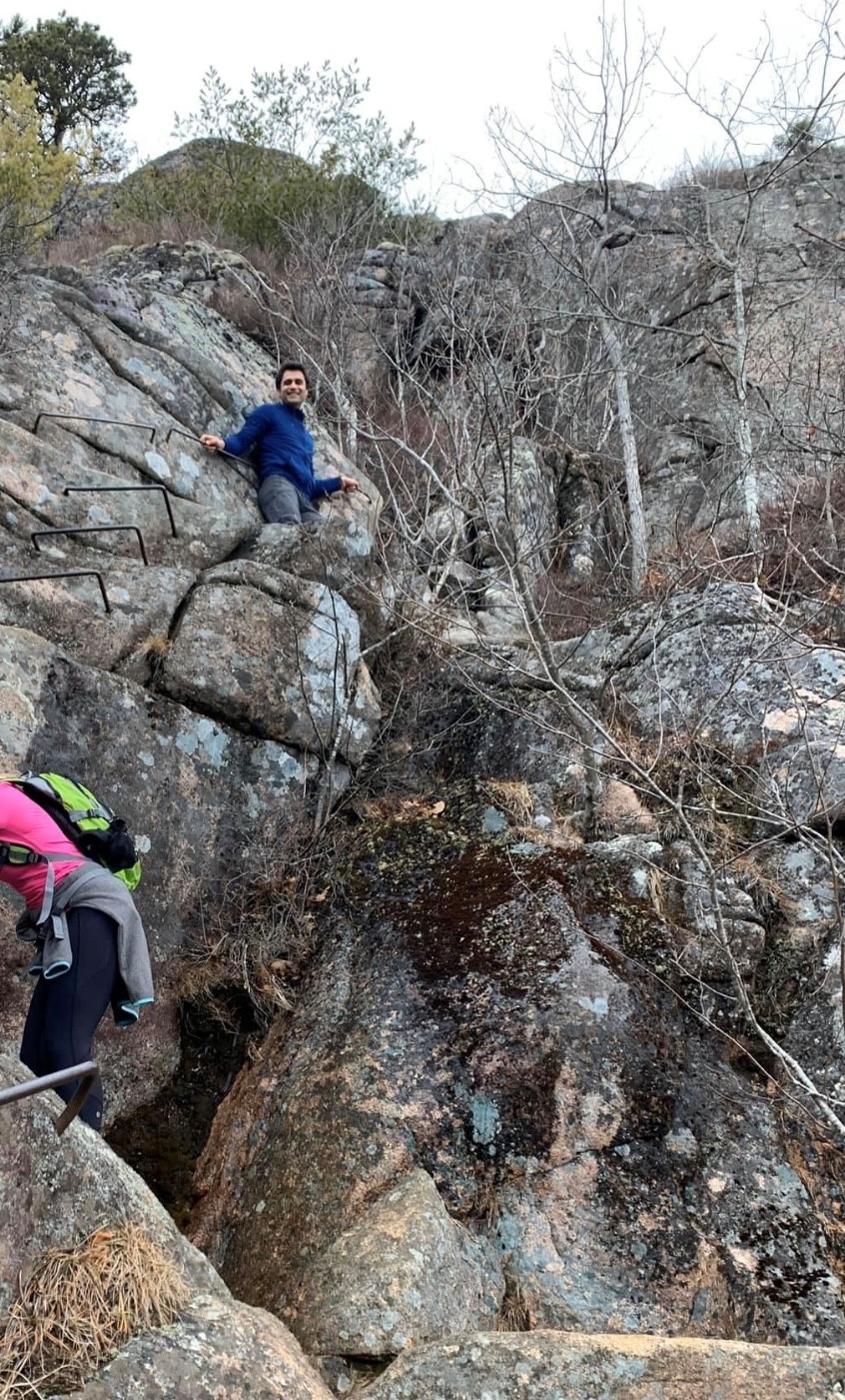
Im schwierigeren Teil der Precipice Loop des Acadia-Nationalparks
© privat
DFG: Professor Haller is working on the production of kidney tissue from stem cells in Maine. Couldn’t he do that just as well in Hanover?
ND: That’s something you’d have to ask him yourself. In any case, I’m glad he helped me find a way of doing a research stay in the USA: it has broadened my professional horizon enormously and has been highly enriching due to the vital contacts I’ve gained for my professional network, as well as being a fantastic experience at the personal level. At the risk of repeating myself here: my special thanks go to the DFG for having made this stay in the USA possible for me in the first place.
DFG: Is German research too thorough or too cautious?
ND: Well, I grew up in Germany, so I can’t really answer that! However, you do tend to get that impression when you’re abroad. I’m not sure that’s only bad news though. After all, we should always be mindful of the patient, and German caution has often proved its worth. Take the opioid epidemic in the USA, for example: oxycodone is regulated by the narcotics law in Germany, while until relatively recently doctors in the USA have prescribed the drugs liberally even for moderate pain.
DFG: Where would you like your career to go from here?
ND: At the end of the summer I’m going back to Hanover, where I've been accepted onto the “PRACTIS” program at the Medical School. It’s a program that is co-financed by the DFG and dedicated to promoting clinician scientists. I’ll be released for another 18 months to do my research and have sufficient material resources for further projects of my own, so I subsequently hope to be able to apply successfully for a junior research group leader position. After that, we’ll see.
DFG: In your CV you mention an interest in football, volleyball and foreign cultures. Are you a fan of a particular club? And how do you pursue your interest in foreign cultures?
ND: Since they’ve won the Bundesliga ten times in a row, I hardly dare say it, but I am actually a fan of Bayern Munich. Given my immigrant background, that’s probably some kind of over-adaptation to German common sense: emotionally speaking I should probably be more of a Dortmund or Hanover 96 fan. I enjoy foreign cultures mainly when I travel, and when I can’t – which is most of the time – I do so by pursuing fairly eclectic listening habits in music.
DFG: What else is important to you; what makes you happy?
ND: Professionally, as I mentioned before, it’s those three factors of discovery, helping, and recognition; in my private life it’s definitely family. My four siblings now have quite a few kids of their own, and with a large extended family that regularly celebrates festivals in a befitting manner, it does make me aware that family has a dimension that is more than just being a source of neuroses.
DFG: One last question: might you already have research findings that could potentially be of interest to investors?
ND: Yes, but I don’t expect to earn big money through research, even with an MBA. I’m still concerned with understanding things and then getting recognised for my achievements. If you’re after money, you have no business in science or even in a hospital. There are other sectors of the free market economy better suited to that purpose.
DFG: In that case, thank you very much for this interesting and entertaining interview and we wish you all the very best for the future – not least hoping you’ll achieve rapid success with your projects so that we can soon all regenerate with fewer scars than before!